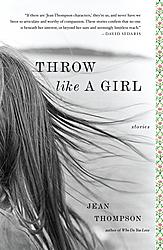Throw like a Girl

After being asked what she wanted for her readers to take away from Throw Like a Girl, Jean Thompson answered that she hoped they appreciate the “transforming power of literature, how can it remove us from the everyday world and let us see with new eyes.” And this book does just that: it takes us away from the everyday world and then painfully drops us back with the suspicion that this fiction is actually very real.
The horrors of normalcy and the tedium of a common life are the forces that drive the majority of the characters in these twelve stories; our “heroines” are far from the romantic or ladylike ilk, but instead more like tough, strong and violent. On the opposite side stand the men in these accounts, mostly unsuccessful and lost, they portray what nobody wants and what most end up getting.
In “The Brat,” a spooky but familiar story about teenage anger Iris, the twelve year old outcast main character that is not “pretty or smart or nicey-nice,” hates everybody and everything, and we hate her; we hate her and we understand her because we have been there. This character, as most in this collection, is like we were, are or will be. All of these women have the urge to live, to act on their thoughts and to get what they really want, and we know that getting what you really want is a trap. We know that if we go for the cheese it will cut our heads off, and we do it anyways. Jean Thompson is the story teller of our own collective story.
Lust and boredom force Mel in “A Normal Life” to leave her children and husband to marry the man she was having a hot and heavy affair with just to go around in the circle of dissatisfaction, where she ceases being a "sexy siren" and instead becomes “just another nagging, squawking wife.”
“The Family Barcus” analyzes the life of a perfect American family, with an obsessively optimistic father who eventually gives up on life. It’s told in a first-person velvety prose that slips into the brain and tightly wraps it for a long time.
The wit and black humor of the title are splendidly sinister. Throw Like a Girl is a phenomenal account, and when you read it, you’ll understand why it bears the title of the collection.